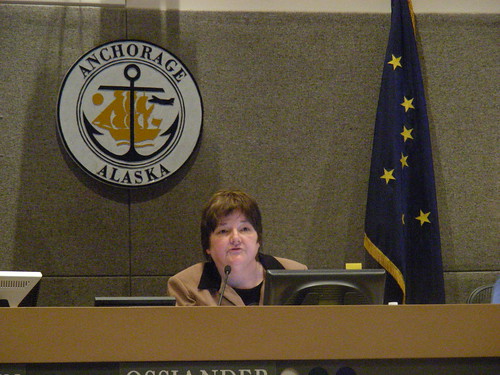Anchorage Assembly Chair Debbie Ossiander made extensive comments on August 11 explaining why she would not support passage of the Anchorage equal rights ordinance, AO 2009-64. [Ref #1] Included in her comments was her opinion about Title VII f the Civil Rights Act of 1964 (Pub. L. 88-352), as follows (tip o’ the nib to John Aronno of Alaska Commons for transcription):
I also discovered that, though what we are proposing as protection at the municipal level, through the Equal Rights Commission, there are some federal regulations and laws that could pertain here. I particularly looked at Title VII, what was covered in Title VII, I read some court cases, I read some court cases about Title VII, it’s basically the civil rights law of the United States, and it basically covers, in my mind, employee discrimination, including same sex employee discrimination, for businesses with over fifteen employees.

Pamela Kelley (right) talking with Jean Craciun during a break at the July 21 Anchorage Assembly meeting
This was in spite of testimony before the Assembly on July 21 by Anchorage attorney and UAA Justice professor Pamela Kelley to the effect that, no, in fact existing law does not protect LGBT people from discrimination [Ref #2] and a followup letter Prof. Kelly sent the following day to Ossiander and to Assembly Member Jennifer Johnston about a U.S. Supreme Court case arising out of Title VII, Oncale v. Sundowner Offshore Services, Inc., 523 U.S. 75 (1998). [Ref #3] As discussed in my post about Prof. Kelley’s letter, Oncale is one case which demonstrates how narrowly the Supreme Court interprets Title VII’s provisions regarding sex discrimination — which does not extend to sexual orientation. [Ref #4]
Now comes a case decided last Friday in the 3rd U.S. Circuit Court of Appeals, Prowel v. Wise Business Forms. This case involved a self-described effeminate gay man who claimed his employer discriminated against him because he failed to conform in his mannerisms, style of dress, and interests to masculine gender role stereotypes, in violation of Title VII’s prohibition of sex discrimination. [Ref #5] The 3rd Circuit based its decision in Prowel on another Title VII case, the 1989 U.S. Supreme Court decision Price Waterhouse v. Hopkins, which ruled in favor of a woman who had been discriminated against because she did not conform to traditional norms of femininity. [Ref #6] As summarized by Marquette law professor Paul Secunda,
That’s called sex-stereotype discrimination… when an employer says to someone “you’re not acting ‘female enough’ or ‘male enough,’ therefore we’re firing you.” [Ref #7]
In other words, Price-Waterhouse v. Hopkins clarified that by making sex discrimination in employment illegal, Title VII also made sex-stereotype discrimination illegal. But it did not make sexual orientation discrimination illegal, as demonstrated by numerous references in Prowel. For example:
- “a claim for sexual orientation discrimination — which is not cognizable under Title VII” [Ref #5, p. 10]
- quoting from a prior 3rd Circuit decision in Bibby v. Philadelphia Coca Cola Bottling Co. [Ref #8], “Title VII does not prohibit discrimination based on sexual orientation. Congress has repeatedly rejected legislation that would have extended Title VII to cover sexual orientation” [Ref #5, p. 10]
- again, in reference to the Bibby decision, “Despite acknowledging that harassment based on sexual orientation has no place in a just society, we explained that Congress chose not to include sexual orientation harassment in Title VII” [Ref #5, p. 12]

Emmett Honeycutt (portrayed by Peter Paige) in Showtime's "Queer As Folk" — like Brian D. Prowel, a Pennsylvanian with "pizzazz". (Showtime promotional image)
The question in Prowel was whether Brian D. Prowel, the plaintiff, had been discriminated against for being homosexual — in which case he had no recourse for a complaint under Title VII — or for not conforming to gender stereotypes — in which case he did. The court was clear in any case that,
There is no basis in the statutory or case law to support the notion that an effeminate heterosexual man can bring a gender stereotyping claim while an effeminate homosexual man may not. [Ref #5, p. 17; emphasis in original]
and hence concluded,
As long as the employee — regardless of his or her sexual orientation — marshals sufficient evidence such that a reasonable jury could conclude that harassment or discrimination occurred “because of sex,” the case is not appropriate for summary judgment. For the reasons we have articulated, Prowel has adduced sufficient evidence [of sex-stereotyping discrimination] to submit this claim to a jury. [Ref #5, p. 17]
What this means in essence is that within the 3rd Circuit’s jurisdiction at least — which includes Pennsylvania, New Jersey, Delaware and the Virgin Islands [Ref #9]:
- An effeminate gay man fired from his job might have recourse under Title VII, but only if he can prove he was discriminated against based on gender stereotypes, rather than sexual orientation. A gay man who’s butch? SOL.
- Likewise, a lesbian with a mannish or butch presentation (like me!) might have recourse — but again, only if she can prove she was canned for being butch, not for being a lesbian. But a femme lesbian? Too bad so sad.
The 3rd Circuit’s decision is not precedential for Alaska, which is covered by the 9th Circuit Court of Appeals. But there is no reason to suspect that the judges of the 9th Circuit have any different understanding than the judges of the 3rd Circuit when it comes to the relevance of Title VII to sexual orientation discrimination. Let me repeat: SOL. Let me repeat: Too bad, so sad.
So display your gender stereotype noncomformity freely. But keep your sexual orientation firmly in the closet. At least, that’s what the case law on Title VII has to say about it. And that will remain the case until, if and when, the U.S. Supreme Court rules that Title VII’s sex discrimination provision includes sexual orientation discrimination, or until Congress amends Title VII to add sexual orienation through an Employment Non-Discrimination Act (ENDA), as has been proposed in both houses of Congress recently. [Ref #7] Until then, as Paul Secunda explained to the Wall Street Journal’s Law Blog,
…while certain states and cities have laws prohibiting employment discrimination on the basis of sexual orientation, the Supreme Court has never ruled that sexual orientation is covered by Title VII. [Ref #7]
It may all the same be true what Debbie Ossiander said of Title VII, that “it basically covers, in my mind,. employee discrimination, including same sex employee discrimination.”
But what counts with Title VII isn’t what’s in Debbie Ossiander’s mind — but in what the courts have ruled. So while she may have partially salved her own conscience with her mistaken notions about Title VII, reality is that thanks to her “no” vote on AO 2009-64, and what seems likely to be her refusal to override Mayor Sullivan’s veto of it, LGBT people in Anchorage have no more protection from the unfair job discrimination than they they do in housing, public accommodations, financial practices, and municipal practices.
In the meantime, Brian D. Prowel: I wish you the very best. What your coworkers and employer subjected you to was inexcusable. Readers of this blog can read the full court decision to see just how nasty they were. And rest assured that some Anchorage employers and coworkers are every bit as nasty. Too bad. So sad. No recourse here.
References
- 8/13/09. “Third time in 35 years: Anchorage’s equal rights ordinance” by Melissa S. Green (Henkimaa).
- 7/23/09. “Kelley testimony 1: Contrary to prior Assembly testimony, existing law does not protect LGBT people from discrimination” by Melissa S. Green (Henkimaa).
- 7/23/09. “Kelley testimony 2: Oncale Supreme Court decision on workplace sexual harassment does not protect LGBTs from discrimination” by Melissa S. Green (Henkimaa).
- Oncale v. Sundowner Offshore Services, Inc., 523 U.S. 75 (1998).
- 8/28/09. Prowel v. Wise Business Forms. U.S. Court of Appeals for the Third Circuit. Opinion written by Judge Thomas M. Hardiman.
- Price Waterhouse v. Hopkins, 490 U.S. 228 (1989).
- 9/1/09. “On Sexual-Orientation and Title VII: Are Changes Afoot?” by Ashby Jones (WSJ.com Law Blog).
- Bibby v. Philadelphia Coca Cola Bottling Co., 260 F.3d 257 (3d Cir. 2001); cited in Prowel v. Wise Business Forms.
- 8/29/09. “Appeals court allows gender stereotype case” by Paula Reed Ward (Pittsburgh Post-Gazette).
[Crossposted at Celtic Diva’s Blue Oasis]


5 Responses to No, Debbie, Title VII does NOT prohibit sexual orientation discrimination in employment. Hello?